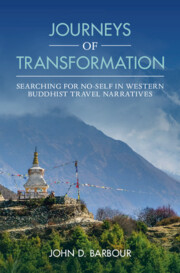Book contents
- Journeys of Transformation
- Reviews
- Journeys of Transformation
- Copyright page
- Dedication
- Contents
- Acknowledgments and Author’s Note
- Introduction A Literary Genre and Some Questions about Self-Transformation
- Chapter 1 The Origins of the Genre
- Chapter 2 Peter Matthiessen’s The Snow Leopard and Nine-Headed Dragon River
- Chapter 3 In a Zen Monastery
- Chapter 4 Thomas Merton and Christian and Jewish Pilgrims in Buddhist Asia
- Chapter 5 Walking the Dharma on Shikoku and in India
- Chapter 6 Trekking and Tracking the Self in Tibet
- Chapter 7 Life-Changing Travels in the Tibetan Diaspora
- Chapter 8 Encounters with Theravada Buddhism
- Chapter 9 Searching for Chan Buddhism after Mao
- Conclusion Theories of No-Self, Stories of Unselfing, and Transformation
- Bibliography
- Index
Chapter 3 - In a Zen Monastery
Ambiguous Failure and Enlightenment
Published online by Cambridge University Press: 12 March 2022
- Journeys of Transformation
- Reviews
- Journeys of Transformation
- Copyright page
- Dedication
- Contents
- Acknowledgments and Author’s Note
- Introduction A Literary Genre and Some Questions about Self-Transformation
- Chapter 1 The Origins of the Genre
- Chapter 2 Peter Matthiessen’s The Snow Leopard and Nine-Headed Dragon River
- Chapter 3 In a Zen Monastery
- Chapter 4 Thomas Merton and Christian and Jewish Pilgrims in Buddhist Asia
- Chapter 5 Walking the Dharma on Shikoku and in India
- Chapter 6 Trekking and Tracking the Self in Tibet
- Chapter 7 Life-Changing Travels in the Tibetan Diaspora
- Chapter 8 Encounters with Theravada Buddhism
- Chapter 9 Searching for Chan Buddhism after Mao
- Conclusion Theories of No-Self, Stories of Unselfing, and Transformation
- Bibliography
- Index
Summary
This chapter considers Zen monastic memoirs that describe experiences in a Japanese monastery. Janwillem van de Wetering’s The Empty Mirror (1973) was one of the first extended autobiographical accounts of the quest for enlightenment. Van de Wetering wrote about experiences off as well as on the meditation cushion and emphasized failure, not the attainment of satori. Three later travel memoirs by Maura O’Halloran, David Chadwick, and Gesshin Claire Greenwood also depict a lengthy sojourn in a Zen monastery and a frustrating search for self-transformation. Yet all these authors experience a form of unselfing and an altered understanding of the Dharma and Buddhist practice. In each of these four narratives, the ambiguous failure of the quest for enlightenment reveals how the author’s life was nonetheless transformed by Zen monastic practice. Departure from the monastery means that selfless practice may take place anywhere and is not a matter of achievement or accomplishment.
Keywords
- Type
- Chapter
- Information
- Journeys of TransformationSearching for No-Self in Western Buddhist Travel Narratives, pp. 63 - 98Publisher: Cambridge University PressPrint publication year: 2022

